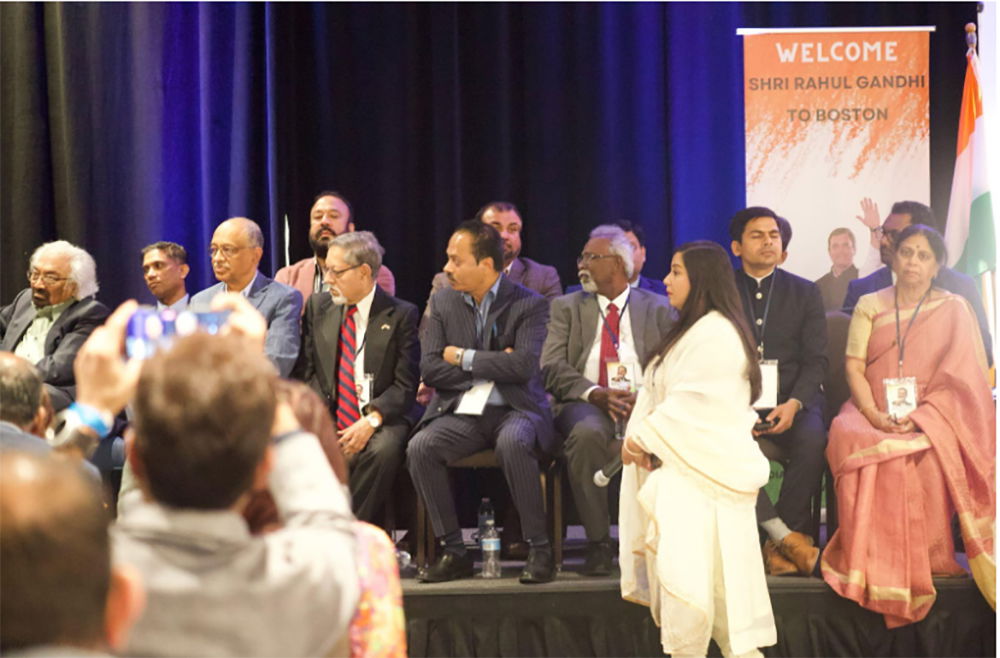America
Rahul Gandhi Addresses Diaspora: Champions Democratic Reform, Youth Empowerment, and Electoral Integrity

Boston, MA – April 20, 2025 –
In a warm and impactful address to the Indian diaspora, Hon. Shri Rahul Gandhi, Member of Parliament and Leader of the Opposition spoke to a packed audience at the Marriott Boston Long Wharf during a special Meet and Greet hosted by the Indian Overseas Congress (IOC) USA. The event drew attendees from across New England and beyond, eager to hear his vision for India's future.
Gandhi began by expressing heartfelt appreciation for the community's discipline and dedication. He noted that the Indian Overseas Congress and its members serve as vital ambassadors for the Congress Party and India itself. "Your presence and commitment bring great respect to our country abroad. This relationship we share is not merely political—it's a bond of family, rooted in love, values, and mutual respect," he said.
The core of his address focused on ongoing efforts to transform the Indian National Congress from within. Gandhi detailed a reform initiative underway in Gujarat aimed at decentralizing power within the party's structure. He emphasized empowering local leaders by giving decision-making authority to district presidents and their committees. "We're building a system where voices from the ground—including those of our overseas brothers and sisters—will be heard and respected. Constructive competition, accountability, and accessibility will shape the new Congress," he affirmed.
In a stirring reflection on India's diversity, Gandhi spoke against the growing tide of ideological centralization under the RSS-BJP regime. "India is not defined by one language, one religion, or one tradition. Its soul is pluralistic, where a Punjabi, a Malayali, and a Gujarati can sit together in harmony. This is India, which is under attack today." He warned that attempts to impose a singular ideological narrative threaten the very foundation of Indian democracy and unity.
He also drew attention to the challenges the opposition faces in today's India, including the capture of mainstream and social media, which limits public access to alternative viewpoints. Despite these roadblocks, Gandhi pointed to the recent Lok Sabha elections, where the BJP faced unexpected resistance, as a sign that the tide is turning. "This is a fight between two ideologies—one that believes India belongs to everyone and another that seeks to concentrate power and wealth among a select few. We've faced harder battles before, and we will prevail."
Following his keynote, Gandhi opened the floor to an unscripted Q&A session, responding to critical questions from the audience. When asked about voting irregularities in Maharashtra, he raised serious concerns about the integrity of India's electoral system. He cited that between 5:30 and 7:30 PM during the state election, over 650,000 votes were reportedly cast—a physical impossibility based on voter speed and capacity. Requests for official videography, as required by law, were denied and followed by changes to the law to prevent such requests in the future. "This indicates a compromised Election Commission," he said. "The issues with Electronic Voting Machines (EVMs) and voter trust are not just ours—even international voices like Tulsi Gabbard have called them hackable. We will continue to raise these issues despite resistance."
A young student in the audience asked how the youth could play meaningful roles in politics despite barriers. Gandhi responded candidly, emphasizing that politics is not easy—it is often grueling and requires resilience. However, he encouraged passionate young minds to get involved through internships and party programs. "If you are patient and committed, we will gladly open the way for you. The future belongs to those who are willing to work for it."
Another question addressed the growing ideological infiltration in India's universities, particularly the appointment of RSS-aligned faculty. Gandhi agreed that the educational system is being misused as a tool for ideological indoctrination rather than academic excellence. "This is damaging our intellectual foundation, and when we return to power, we will look into these appointments seriously."
In his closing remarks, Gandhi acknowledged the short nature of this U.S. visit, having been invited primarily to speak at Brown University. However, he promised to return soon, with plans to visit cities in Illinois, California, Washington, and New Jersey. To enthusiastic applause, he also committed to bringing his sister, Priyanka Gandhi Vadra, along on a future trip.

The evening concluded with a renewed sense of solidarity among attendees, many of whom had traveled great distances to engage with a leader they see as a torchbearer of truth, democracy, and compassion. As Gandhi reminded the audience, "In the marketplace of hatred, we must open a shop of love." His message was clear—India's soul is plural, resilient, and worth fighting for.
George Abraham, the vice-chair of the Indian Overseas Congress, in his speech, encouraged the Boston Diaspora to be a more visible advocate on behalf of democracy, freedom, and equal justice. " Indians are the largest group of economic refugees anywhere in the world where we would like to have our culture respected and religious freedom protected; however, if our motherland is failing to defend those values towards its minority citizens, what message are we sending abroad?" he further implored.





































